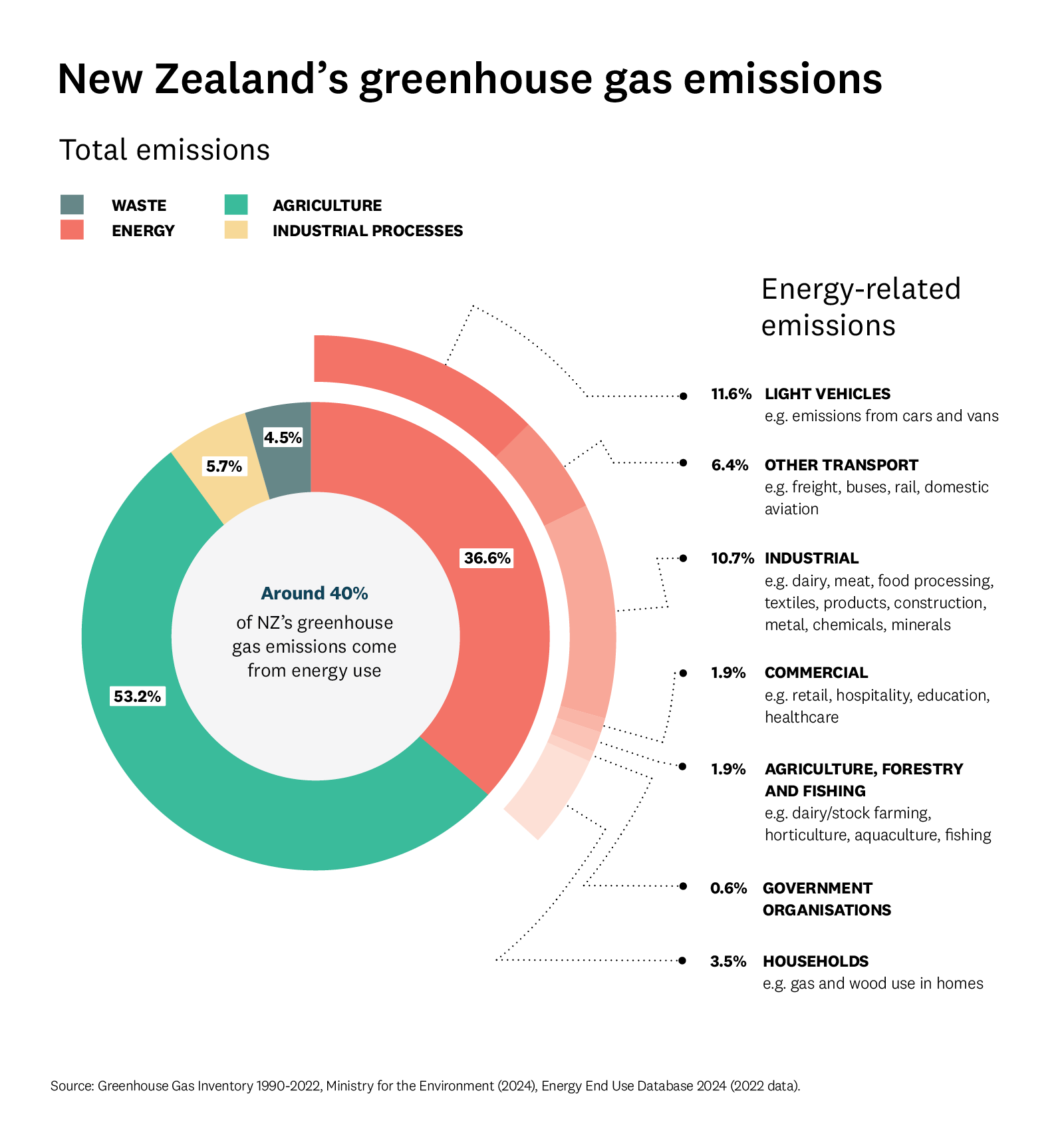The importance of clean and clever energy
About 40% of New Zealand's total greenhouse gas emissions come from our energy use.
We create these greenhouse gases when we burn fossil fuels — by driving petrol cars or diesel trucks, travelling by plane, burning gas for manufacturing or burning coal to create electricity.
Reducing our energy-related emissions is challenging, but possible. By prioritising energy efficiency, adopting smart technologies, and choosing renewable energy sources, we can make our energy system more sustainable.
The make-up of our energy-related emissions
Understanding the make-up of our energy-related emissions is crucial to accelerating our transition to a low-emissions economy.

Reducing emissions from energy
Our desired outcome is a sustainable energy system that supports the prosperity and wellbeing of current and future generations.
Based on our energy scenario modelling, most of New Zealand's energy emissions can be eliminated by 2050 using existing technologies. The scenarios modelled show demand for fossil fuels will have halved. Transport, which makes up around half of all energy-related emissions, will be almost entirely fossil-fuel free, and people will get around on great public transport networks.
If people own a car, it will be electric, and we'll live in smart, fully electric homes, and work in comfortable, energy-efficient offices.
This model is based on the best data we have to date: as technology and pricing improve, and the transition continues worldwide, it's likely to look even better.
Energy in the future
2.06 minutes
Explore what our New Zealand Energy Scenario modelling tells us about our potential future energy system.
Renewable energy is a key opportunity
In New Zealand, around 80-85% of our electricity is generated from clean, renewable resources such as hydro, geothermal and wind. This is one of the highest rates in the world.
But we currently have to top this up by generating electricity from coal and gas, and we are reliant on fossil fuels for 99% of transport energy and around 60% of industrial energy.
Electrification will play a significant role in the low-cost transition away from fossil fuels, alongside other renewable fuels where electrification is not viable.
Accelerating renewable energy is one of our key strategic focus areas at EECA.
Why using electricity efficiently matters
Using electricity more efficiently allows our renewable sources to go further. It also frees up capacity in the electricity system. This means more electricity is available at a cheaper cost, so it becomes more viable to switch from high-emissions fuels, such as petrol and coal, to electricity.
If more New Zealanders switched to energy efficient technology, like LED lighting and heat pumps, we could significantly reduce the cost of meeting our climate commitments and speed up the transition to a low-emissions economy.
Smart technology can help manage increasing electricity demand
As our electricity demand increases and we transition toward greater use of renewable energy sources, demand management is becoming increasingly important.
A ‘smart grid’ has the potential to automatically optimise electricity consumption and generation across households, businesses and industry, leading to a more efficient and affordable energy system for all.
New Zealand's climate change commitments
New Zealand has joined other nations in signing up to targets to reduce emissions. Under the Paris Agreement, we've committed to reducing net emissions to 50% below 2005 levels by 2030. We also have a commitment to reaching net-zero carbon emissions by 2050, under the Climate Change Response Act.
